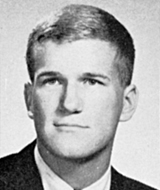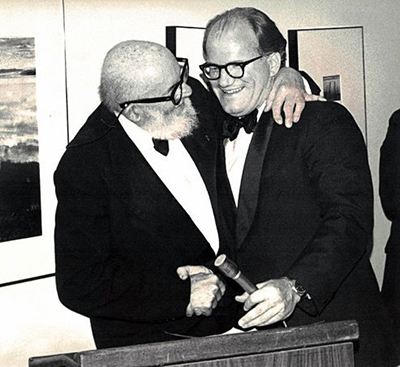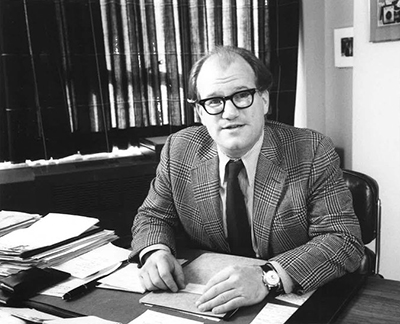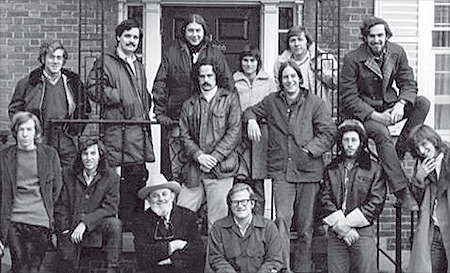In Memoriam
William A. Turnage

Bill Turnage
1964 graduation
Bill Turnage died on October 15, 2017. Here is his obituary from The New York Times, followed by his obituary from Canopy, a publication for alumni of the Yale School of Forestry & Environmental Sciences.
Obituary
William Turnage, Who Reinvented the Wilderness Society, Is Dead at 74
The New York Times
October 18, 2017
William Turnage, who changed the Wilderness Society from a grass-roots organization devoted to protecting public lands to a more professional advocacy group in time to do battle against President Ronald Reagan’s environmental policies, died on Sunday at his home in Mill Valley, Calif. He was 74.
His brother Robert said the cause was stomach and esophageal cancer.

William A. Turnage, right, with the photographer Ansel Adams during
a ceremony in Washington in 1980 in which Mr. Adams received the
Wilderness Society’s Conservation Award. Mr. Turnage was for a time
Mr. Adams’s business manager.
Mr. Turnage had spent time in forestry school and as the celebrated photographer Ansel Adams’s business manager when he was hired by the Wilderness Society as its executive director in 1978. He reinvented the society by phasing out the old guard on its staff and hiring a cadre of economists, foresters, and lawyers who brought authority to its lobbying and studies.
He also hired Gaylord Nelson, a former Democratic senator from Wisconsin with a strong record on environmental issues, as an adviser.
“Bill was a leader in a time of generational transition,” T. A. Barron, an author and longtime member of the society’s governing council, said in an interview. “The founders were big-hearted conservationists who sat around the campfire in the Smoky Mountains and conceived the idea of a Wilderness Act that would protect the wilderness — which, at the time, was a radical idea.”
But by the time Mr. Turnage was hired, Mr. Barron added, “The society was running low on its original fuel.”
Mr. Turnage began his conservation work when the president was Jimmy Carter, whose friendly environmental policy was illustrated by the enactment in 1980 of the so-called Alaska Lands Act. The legislation, spearheaded by Mr. Carter’s interior secretary, Cecil D. Andrus, designated more than 100 million acres for national parks, wildlife refuge and wilderness.
“Seward bought Alaska and Andrus saved it,” Mr. Turnage said, referring to William H. Seward, the secretary of state who negotiated the purchase of Alaska in 1867. (Mr. Andrus died in August.)
But Mr. Turnage had no amicable feelings for James G. Watt, Reagan’s interior secretary, whose stated goal was to transfer significant amounts of federal land to private timber, energy and mineral interests for development.
Mr. Turnage became a frequent and barbed critic. In July 1981 the Wilderness Society published “The Watt Book,” a loose-leaf compendium of actions taken by Mr. Watt that the organization deemed dangerous to the environment — among them imposing a moratorium on acquiring new national parkland and failing to protect national parks from increasing pollution.
“It is both incredible and tragic,” Mr. Turnage said in introducing the book at a news conference, “that a cabinet officer can go astray so quickly that he prompts production of a four-pound book on his actions during his first six months.” He called on Reagan to fire Mr. Watt.
But Mr. Watt was not dismissed and continued to pursue what he described as a “market-oriented, people-oriented” policy to sell public lands and raise money to reduce the federal debt.
When 307 parcels of federal land were about to be sold to private interests in 1982, Mr. Turnage said, “The Reagan administration is pirating the public treasure for public benefit.”
And as energy companies intensified pressure on the administration to approve applications for oil and gas drilling in wilderness areas, Mr. Turnage issued a warning: “If Watt messes with the wilderness system, he will find it is like sticking his hand in a Cuisinart.”
Mr. Watt resigned the next year, having accomplished some but not all of his goals. But his successor, William P. Clark, Reagan’s former national security adviser, did not find a friend in Mr. Turnage, either.
“It’s an appalling appointment,” Mr. Turnage said. “Clark knows nothing about the environment.”

William Turnage, executive director of the Wilderness Society, in 1980
James Morton Turner, author of “The Promise of Wilderness: American Environmental Politics Since 1964” (2012), said in an interview that Mr. Turnage had been a “transformative figure” who developed the Wilderness Society’s abilities to make scientific and economic analyses of public land issues.
“Documenting James Watt’s attacks on public lands was a central part of his legacy,” Mr. Turner said.
William Albert Turnage was born in Tucson on Dec. 9, 1942. His father, William V. Turnage, was an economist for the federal government. His mother, the former Erna Rassow, who was born in Panama, was a homemaker.
After graduating from Yale with a degree in history and studying history at Balliol College, Oxford, Mr. Turnage worked at the Alliance for Progress, an economic assistance program for Latin American countries established by President John F. Kennedy.
He attended Yale Law School but transferred to the Yale School of Forestry and Environmental Studies, while also working as an associate fellow at the Yale Chubb Fellowship. He met Mr. Adams, whose black-and-white pictures of Western American landscapes made him one of the world’s most famous photographers, when Mr. Adams was invited to be a fellow. Mr. Turnage left the school soon after to accept Mr. Adams’s offer to become his business manager.
While they were working together, Mr. Turnage persuaded Mr. Adams, then in his 70s, to stop making prints in his darkroom. “I said, ‘You could continue to concentrate on books,’ ” Mr. Turnage told The New York Times in 2013. “ ‘They’ve been very successful. Your needs aren’t huge. You don’t need to make $3 million a year. You’ll free yourself from the darkroom.’ ”
Mr. Adams agreed — and his photographs became even more ubiquitous, not only in books but also on posters and in calendars.
During his time at the Wilderness Society, Mr. Turnage helped arrange a meeting in 1983 between Reagan and Mr. Adams, who had described Reagan’s environmental policies as “disastrous.” After the meeting, which lasted nearly an hour, Mr. Adams told The Washington Post, “I got a feeling he doesn’t have any fundamental interest or knowledge in the environment as a concept.”
Mr. Turnage left the Wilderness Society in 1985 and took a sabbatical in Europe. While in Kitzbuhel, Austria, he went to a store to buy hiking boots and met Annemarie Murauer, the manager. She eventually became his third wife. (He had by then been twice divorced.)
Mr. Turnage returned to the United States to work at the publishing rights trust established by Mr. Adams, who had died in 1984.
In 2010, Mr. Turnage and the trust became embroiled in a legal dispute over a claim that a box of negatives bought at a garage sale in Fresno, Calif., by Rick Norsigian, who worked in a school maintenance department, were the work of Mr. Adams, from the 1920s and ’30s.
The trust sued Mr. Norsigian, saying that the sale of prints from the negatives was a trademark violation; Mr. Norsigian countersued, claiming that Mr. Turnage, the managing trustee, had slandered him on CNN by saying that attempts to authenticate the negatives as Mr. Adams’s were the work of a “bunch of crooks.”
The dispute was settled in early 2011 with an agreement by Mr. Norsigian not to sell prints and posters using Mr. Adams’s name or likeness. Mr. Turnage continued to work at the trust until last year.
In addition to his brother Robert, he is survived by his wife; his sisters, Margaret Hebson and Diane Keedy; and another brother, James. His earlier marriages were to Andrea Stillman and Charlotte Wilson.
Although Mr. Turnage was not born to environmentalism — his brother Robert said the family was not “super outdoorsy” — he became a strong advocate at the Wilderness Society.
“Bill helped us transition to being the leading voice in protecting and conserving the wilderness, one of those amazing elements of our national heritage,” Mr. Barron, the author, said. “He knew how precious and fragile those places are.”
Obituary
Canopy
Spring 2018
[Canopy is a publication for the alumni of the Yale School of Forestry & Environmental Sciences. Canopy credits the story and photo to Bill's brother Robert Turnage '82 M.F.S.]
William A. "Bill" Turnage ' 65 B.A., '71 For (1942 - 2017) passed away at his home in Mill Valley, Calif., on October 15, 2017. A graduate of Yale College, he was enrolled as a special student at the Yale School of Forestry between 1969 and 1971 while also managing the Chubb Fellowship program at Timothy Dwight College.

Ansel Adams with Bill Turnage
(front center, left to right),
at Yale the week they first met in 1970
For almost four decades until his retirement in December 2016, Bill was the managing trustee of the Ansel Adams Publishing Rights Trust, established by the photographer to safeguard his artistic work and legacy following his death. His trusteeship was a natural extension of a long association with Ansel Adams that began In 1970, when Bill invited him to Yale as a visiting Chubb Fellow. One evening. near the end of a week of lectures and seminars, he asked Bill to move to California to manage his business affairs.
Thus began a long and productive collaboration between the two men, which grew from artistic and business concerns to advocacy on environmental issues, even after Bill moved to Washington, D.C. in 1978 to lead The Wilderness Society.
Bill's tenure as President of The Wilderness Society was marked by a dramatic upturn in the profile, activism, and professionalism of the organization. He developed close ties with congressional leaders and worked with a coalition of environmental groups to gain passage of the Alaska Lands Conservation Act. signed by President Carter in 1980. The Act protected 157 million acres of parks, wilderness, and wildlife refuges. During the Reagan years The Wilderness Society played aggressive defense. Bill was one of the first environmental leaders to challenge Reagan’s appointment of James Watt as Secretary of the Interior and continued to campaign against Watt's policies until Watt's resignation in 1983.
He is survived by his wife, Annemarie, two brothers, and two sisters.

